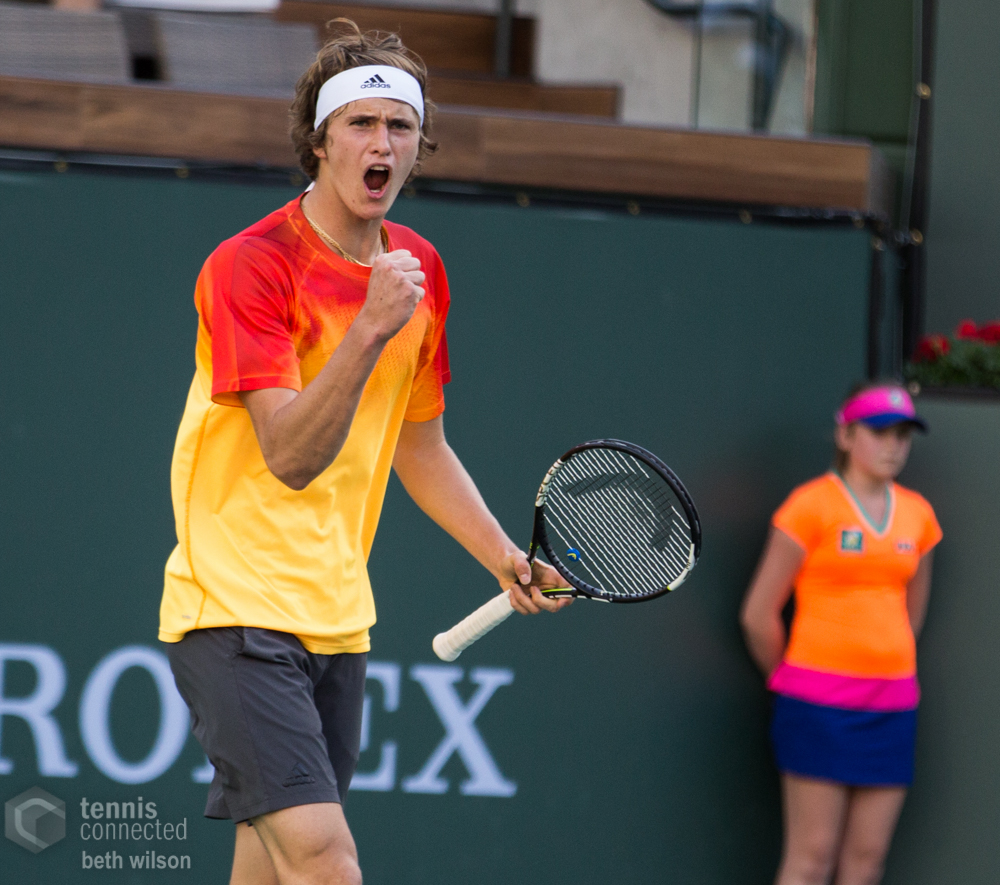by: Ben Stevens
It’s been an interesting few weeks for Sascha Zverev.
Two weeks ago, the 19-year-old German secured his second career title in Montpellier, scoring wins over Jo-Wilfriend Tsonga and Richard Gasquet en route. Days later, he fell in the first round in Rotterdam to Dominic Thiem, and then a week after that, repeated the feat with a loss to Nicolas Mahut in Marseille. Not exactly the most consistent run of results for what is undoubtedly, the brightest light of the ATP’s up-and-comers, and one that deserves a closer look.
Why? You may ask. Well, here’s the thing: As good as Zverev clearly is – his current, career-high ranking of 18 is the highest for any teenager since Novak Djokovic reached no. 16 in 2006 – he’s still got a ways to go to become the next Djokovic, and realistically that should be the goal. The quality he displayed in beating Tsonga and Gasquet suggests he’s on the verge of going from being the “next big thing” to just the “big thing”, and that’s not an unreasonable assumption based on the trajectory of most tennis greats. Turning 20 in April, Zverev will suddenly find himself at an age when Djokovic won his first major, Nadal had already taken two, and Federer had cracked the top-10 – that’s the bar Zverev is dealing with, unfair as it may be. If he wants to keep pace with the greats, he’ll have to seize the excellent learning opportunity these losses have given him.
Against both Thiem and Mahut, the match came largely down to a question of mental toughness – one Zverev was not able to answer. Against Thiem, it was a sloppy service game at 4-4 in the third that sealed his fate, against Mahut an especially nervous one at 4-1 in the second. In both cases Zverev seemed a passenger on the emotional rollercoaster, and it cost him. Maybe he was having an off-day, and that’s okay (particularly against Thiem, just days after the Montpellier title), but the best players find a way to if not extinguish at least control such negativity – and yes, that includes Andy Murray.
From a technique perspective there were several takeaways too. His serve simply isn’t the consistent weapon it should be, winning only 61% of first-serve points against Thiem who, being a man not particularly known for his return, is more problematic than Rafa Nadal’s hair loss. Against Mahut he served better statistically, but compared to the Frenchman it still came up short, and he would do well to learn the value of a strong serve that a journeyman like Mahut has employed to such great success. His forehand remains a work in progress, coming-and-going against Thiem, lacking lethality against Mahut. Thiem also exposed a glaring weakness in his footwork, namely an inability to create space for balls hit close to his body, and that too will have to be corrected.
All that said, there’s some good news too. Firstly, he’s got his bandanna game on lock – the men’s tour needs one top guy who can actually pull off a bandanna without looking like a complete tosser at all times, and Zverev’s going to be that guy. More importantly however, we saw against Tsonga and Gasquet a confident, heavy-hitting baseliner that when “on”, doesn’t really give his opponent a chance. He can’t be beaten by pace, while his feel is so good he’s able to take large cuts at the ball from anywhere. His backhand is a problem for anyone, while he can create depth and angles off the forehand wing, and his consistency is bound to improve in that aspect when he acquires a new coach (seriously Boris, get on it). Perhaps most impressively, his court coverage and defense is what you’d expect out of a man six inches shorter, and with another offseason of weightlifting, won’t lack for physical tools. The foundation of a star is clearly there, he just needs to build on it.
Given the significantly rapid pace that young tennis players tend to improve at, it’s not unreasonable to foresee Zverev reaching a major final as early as this year, it’ll just take a truckload of work to pull it off. Thiem and Mahut highlighted legitimate flaws, but he demonstrated against Tsonga and Gasquet that he is tantalisingly close to making the leap. Maybe Zverev simply can’t win ‘em all, or maybe he just can’t win ‘em all… yet.





















